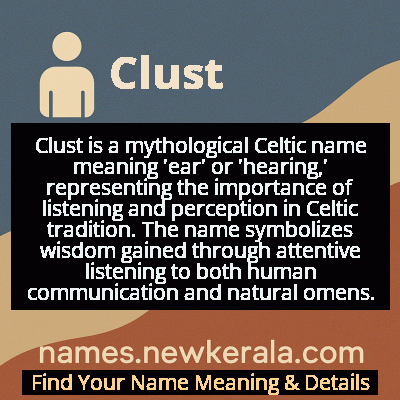Clust Name Meaning & Details
Origin, Popularity, Numerology Analysis & Name Meaning of Clust
Discover the origin, meaning, and cultural significance of the name CLUST. Delve into its historical roots and explore the lasting impact it has had on communities and traditions.
Name
Clust
Gender
Male
Origin
Celtic
Lucky Number
3
Meaning of the Name - Clust
Clust is a mythological Celtic name meaning 'ear' or 'hearing,' representing the importance of listening and perception in Celtic tradition. The name symbolizes wisdom gained through attentive listening to both human communication and natural omens.
Clust - Complete Numerology Analysis
Your Numerology Number
Based on Pythagorean Numerology System
Ruling Planet
Jupiter
Positive Nature
Optimistic, inspirational, and creative.
Negative Traits
Scattered, exaggerating.
Lucky Colours
Yellow, gold, purple.
Lucky Days
Thursday.
Lucky Stones
Yellow sapphire.
Harmony Numbers
1, 2, 9.
Best Suited Professions
Arts, writing, communication.
What People Like About You
Creativity, optimism.
Famous People Named Clust
Clust ap Clustfeinad
Mythological Figure
Son of Clustfeinad in Welsh mythology, known for his exceptional hearing abilities
Clust Wyddel
Bardic Poet
Welsh poet credited with preserving early Celtic oral traditions through mnemonic techniques
Clust mac Aed
Tribal Chieftain
Leader of a Brythonic tribe in northern Britain known for his diplomatic listening skills
Clust ferch Llywarch
Scholar
Female scholar who transcribed Celtic oral histories into written manuscripts
Name Variations & International Equivalents
Click on blue names to explore their detailed meanings. Gray names with will be available soon.
Cultural & Historical Significance
In broader Celtic society, names relating to sensory perception were often given to children believed to have special gifts or destinies. Clust would have been a name bestowed upon individuals expected to become keepers of tradition, judges who needed to hear all sides of disputes, or seers who listened for omens in nature. The name reflects the Celtic worldview that understanding comes through careful observation and listening to the whispers of ancestors, the rhythms of nature, and the subtle messages of the gods. This cultural emphasis on auditory perception distinguished Celtic spiritual practices from other contemporary European traditions.
Extended Personality Analysis
Individuals named Clust are typically characterized by exceptional listening skills and perceptual awareness. They possess a natural ability to absorb information, understand subtle nuances in communication, and remember details that others might overlook. This makes them excellent mediators, counselors, and keepers of knowledge. Their patient, observant nature allows them to see patterns and connections that escape more impulsive personalities. They tend to be reflective rather than reactive, preferring to gather all available information before making decisions or offering opinions.
In social settings, Clusts are often the quiet centers around which conversations revolve—not because they dominate discussions, but because they create space for others to be heard. They have a calming presence and are frequently sought out for advice due to their reputation for fairness and thoughtful consideration. However, this same trait can sometimes manifest as hesitation or over-caution when quick decisions are required. Their strength lies in deep understanding rather than swift action, and they excel in roles requiring careful analysis, historical preservation, or diplomatic negotiation. The modern Clust often finds fulfillment in professions like psychology, research, archival work, or any field where listening and synthesis are valued.
Modern Usage & Popularity
In contemporary times, Clust remains an exceptionally rare given name, primarily used within Celtic revival communities and among families with strong Welsh heritage. The name has seen minimal usage in birth registries across English-speaking countries, with occasional appearances in Wales and parts of Cornwall where Celtic cultural identity is being actively preserved. Modern parents who choose this name typically do so for its deep mythological roots and unique sound rather than any current popularity trends. The name appeals to those seeking distinctive Celtic names that haven't been widely adopted, allowing children to have a name that is both historically significant and uncommon in modern society. Some linguists and Celtic studies enthusiasts have begun using Clust as a middle name to honor ancestral connections while maintaining more conventional first names.
Symbolic & Spiritual Meanings
Symbolically, Clust represents the gateway to understanding, wisdom, and memory. The ear serves as a metaphor for receptivity to knowledge, both earthly and spiritual. In Celtic symbolism, hearing connects the physical world to the Otherworld, allowing communication with ancestors, spirits, and divine beings. The name embodies the concept of 'deep listening'—not merely hearing sounds but comprehending their full meaning and context. It symbolizes the balance between speaking and listening, action and reflection, suggesting that true power lies in understanding before being understood. The symbolic ear also represents discernment, the ability to distinguish truth from falsehood, and the capacity to receive guidance from both visible and invisible sources.

